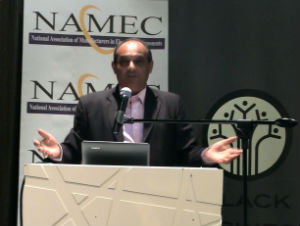‘Conditional access to delay SA’s digital migration’
‘Conditional access to delay SA’s digital migration’

A government plan to introduce set-top boxes (STBs) with conditional access (CA) could compound delays regarding South Africa’s migration to digital television.
This was revealed by the National Association of Manufacturers in Electronic Components (NAMEC) at its digital migration conference in Johannesburg, South Africa on Tuesday.
NAMEC describes itself as an association that represents around 80 emerging electronics and software companies in South Africa.
And according to NAMEC, South Africa’s communications minister Yunus Carrim is expected on November 27 to present a proposed policy to cabinet to decide whether to apply conditional access for the manufacturing of STBs for the country’s digital migration process.
Conditional access, regarding STBs, is described as “access based upon certain condition”.
In terms of digital broadcasting, this means that a user with a CA configured set-top box gets only a certain fixed number of channels, despite the fact that digital broadcasting allows for the increase in the number of channels that people can watch for free.
Television viewers with CA configured set-top boxes will; however, be able to ‘unlock’ these devices to access more free channels, but this could cost an extra $43 (approximately R430).
Government plans to subsidise the price of set-top boxes amid attempts to fast-track digital migration and open up frequency for greater broadband access in South Africa.
But Keith Thabo, president of NAMEC, has explained that if South Africa adopts the conditional access system for digital migration, it would be the first country in the world to do so.
“Conditional access will increase the barrier to entry into this market for many emerging black manufacturers as they will need to be accredited by a conditional access vendor first before they can manufacture the STBs that has this software,” Keith Thabo, president of NAMEC, has said in a press release.
The NAMEC conference on Tuesday in Johannesburg, which included the Black Business Council (BBC), further set out to discuss the implications of the country's migration process for consumers and black businesses.
NAMEC, the BBC and other stakeholders say that the inclusion of conditional access as part of the manufacturing of set-top boxes (STBs) may discriminate against emerging black electronic manufacturers.
And Thabo has gone as far as to say that there shouldn’t be conditional access when it comes to digital migration.
“Not only is it a costly exercise but it can also take up two years before a manufacturer is accredited. By that time they would have missed out on the opportunity to participate in this project,” Thabo has said in the press release.
Also speaking at the conference was NAMEC chairperson of the electronic manufacturing sector, Vijay Panday (pictured), who echoed Thabo’s sentiments.
He said it is “shameful” to see how other African countries are moving forward with digital migration and South Africa still lagging behind.
African countries that have been reported to be moving forward in their digital migration process include Kenya and Zambia, with Tanzania being the only country on the continent to have fully migrated.
Delays to South Africa’s digital migration have been caused by self-interests by certain players, regulatory issues and the technology dilemma, Panday claims.
The association together with the BBC, Communications Workers Union, ACT South Africa and other stakeholders plan to submit a memorandum to cabinet’s subcommittee detailing their discontent with conditional access for the manufacturing of STBs.
A digital migration deadline of June 2015 has been set by the International Telecommunication Union (ITU) and requires that all countries around the world switch from an analogue to a digital broadcasting signal by that date.
